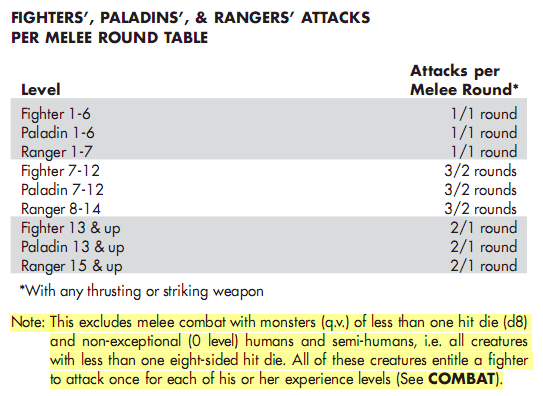I think that this is a point that is pretty fundamental to hp as a system, but that has very different weight at different tables, because of play expectations.There is no directed requirement to create a fictional element for the character. We assume this as part of the ad hoc and arbitrary fiction that might be used. I say might because I believe few tables bother with descriptions of every bit of hp loss. I say arbitrary because no description that is generated ever holds any weight past the description. Whatever you describe never has any further use in the fiction and effectively goes away once it's done. No further fiction ever keys on or uses that description.
<snip>
Even in "hitpoints are neat" no description of injury ever has any further use in the fiction.
If a particular table expects the fiction that comes next to flow (in some fashion or other) from the fiction that has already been established in play, then "epiphenomenal" fiction - like the narration of hp loss that you are describing - will stand out as relatively useless or pointless. And is perhaps likely to be dropped altogether. (That's generally the case at my table, unless someone is in an oratorical mood.)
But if a particular table engages or encounters the fiction of RPGing in a more "performative" fashion, with an emphasis on colourful narration rather than (what I might call) "trajectory", then the fact that the narration of hp loss is mere colour without any trajectory to it may be neither here nor there.
I think 2nd ed AD&D tended to promote this second sort of approach (building on trends in AD&D play that emerged around the DL period), and it seems to have survived at a reasonable number of tables through the 3E and 5e eras. (I think that there were significant tensions between this sort of approach and 4e, but that's another story!)
One result of these differences of approach is that the significance of mechanical systems - and also a sense of what counts as a significant difference between systems - can be experienced quite differently. For the first sort of table, RM or RQ is very different from AD&D because the former systems tell you what is happening in combat - they create a "trajectory" - which is absent from AD&D.
But for the second sort of table, the fact that RM produces colourful narrations that are read of crit tables, whereas AD&D produces colourful narrations that are made up spontaneously by the GM, may not be a significant difference - ie the only experienced difference might be where the narration comes from. The second sort of table might also notice, and dislike, the RM death spiral but that can be divorced from the idea of fiction "mattering", because for the second sort of table fiction "matters" in the way they care about even if it doesn't generate a "trajectory" in the way the first sort of table is looking for.
I think the use of knowledge checks to represent the actual undertaking of research is probably a bit under-utilised in D&D play (compared to, say, CoC - let's leave to one side whether it's good for CoC play to have a lot of knowledge gated behind successful research checks).Knowledge checks in D&D are a terrible bit of mechanics in my book anyway. They're used either for GM info dumps or a gates on what information the GM will allow players to operate on.
In 4e, knowledge checks get used at least two ways. One is in skill challenges, where in structural terms they work like any other skill. The second is monster knowledge checks, where they provide the players with mechanical information that permits more informed decision-making about resource deployment.
I think that second sort of use is quite functional. Whether it's balanced, from the perspective of contribution-to-player-success-per-unit-of-PC-build-element-expended, is another question. I suspect it might be a little OP, but I'm not confident in that judgement because at my table the sage PC was often the weakest in combat (a wizard/invoker whose feats were nearly all spent on out-of-combat abilities) and so bringing monster knowledge to the table was part of what he did rather than sitting on top of what he did (I hope that makes sense).




